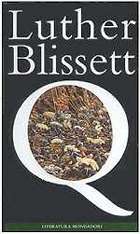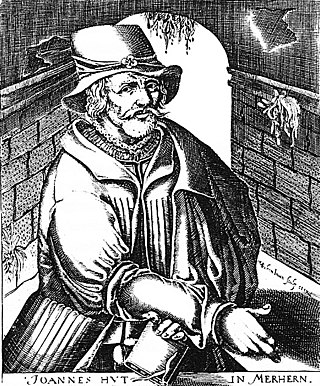Related Research Articles

Anabaptism is a Christian movement which traces its origins to the Radical Reformation.
The 1520s decade ran from January 1, 1520, to December 31, 1529.

Year 1525 (MDXXV) was a common year starting on Sunday of the Julian calendar.

Thomas Müntzer was a German preacher and theologian of the early Reformation whose opposition to both Martin Luther and the Roman Catholic Church led to his open defiance of late-feudal authority in central Germany. Müntzer was foremost amongst those reformers who took issue with Luther's compromises with feudal authority. He became a leader of the German peasant and plebeian uprising of 1525 commonly known as the German Peasants' War. He was captured after the Battle of Frankenhausen, tortured and executed.

Jakob Hutter was a Tyrolean Anabaptist leader and founder of the Hutterites.

Conrad Grebel, son of a prominent Swiss merchant and councilman, was a co-founder of the Swiss Brethren movement.

Q is a novel by Luther Blissett first published in Italian in 1999. The novel is set in Europe during the 16th century, and deals with Protestant reformation movements.

The Zwickau Prophets were three men of the Radical Reformation from Zwickau in the Electorate of Saxony in the Holy Roman Empire, who were possibly involved in a disturbance in nearby Wittenberg and its evolving Reformation in early 1522.

Andreas Rudolph Bodenstein von Karlstadt, better known as Andreas Karlstadt, Andreas Carlstadt or Karolostadt, in Latin, Carolstadius, or simply as Andreas Bodenstein, was a German Protestant theologian, University of Wittenberg chancellor, a contemporary of Martin Luther and a reformer of the early Reformation.
Nikolaus Storch was a weaver and radical lay-preacher in the Saxon town of Zwickau. He and his followers, known as the Zwickau Prophets, played a brief role during the early German Reformation years in south-east Saxony, and there is a view that he was a forerunner of the Anabaptists. In the years 1520-1521, he worked closely with the radical theologian Thomas Müntzer.

Brad Stephan Gregory holds the Dorothy G. Griffin Collegiate Chair in European History at the University of Notre Dame. After spending the spring 2002 semester as a visiting scholar with the Erasmus Institute at Our Lady's University, Gregory came to Notre Dame in 2003 after teaching at Stanford University, where he received early tenure in 2001. He became a full professor of history at Notre Dame in 2012. Gregory formerly served as the director of the Notre Dame Institute for Advanced Studies, which was founded in 2008, from 2013 to 2019. Together with Randall C. Zachman, Gregory also serves as the North American editor of the Archive for Reformation History.

The Radical Reformation represented a response to corruption both in the Catholic Church and in the expanding Magisterial Protestant movement led by Martin Luther and many others. Beginning in Germany and Switzerland in the 16th century, the Radical Reformation gave birth to many radical Protestant groups throughout Europe. The term covers radical reformers like Thomas Müntzer and Andreas Karlstadt, the Zwickau prophets, and Anabaptist groups like the Hutterites and the Mennonites.
The Peasant War in Germany by Friedrich Engels is a short account of the early-16th-century uprisings known as the German Peasants' War (1524–1525). It was written by Engels in London during the summer of 1850, following the revolutionary uprisings of 1848–1849, to which it frequently refers in a comparative fashion. "Three centuries have flown by since then," he writes, "and many a thing has changed; still the peasant war is not as far removed from our present-day struggles as it would seem, and the opponents we have to encounter remain essentially the same."

Hans Hut was a very active Anabaptist in southern Germany and Austria.

Eric W. Gritsch was an American Lutheran ecumenical theologian and Luther scholar.
Wilhelm Reublin was a leading figure of the Swiss Brethren movement. Reublin was born in 1484 in Rottenburg am Neckar. In 1521, after studying theology in Freiburg and Tübingen, Reublin became the pastor at St. Alban in Basel and began to advocate reform. St. Alban was soon the center of the evangelical movement in Basel. In the Fall of 1522 Reublin was expelled from the city for his Reformation sermons and moved to Witikon in 1524, where he became the local pastor and preached against infant baptism. Reublin was with Conrad Grebel and Felix Manz in Zürich in January 1525 at the birth of the Anabaptist movement. Reublin took part in a disputation on 17 January 1525 after which Grebel, Mantz and Reublin were given eight days to leave the canton.

The German Peasants' War, Great Peasants' War or Great Peasants' Revolt was a widespread popular revolt in some German-speaking areas in Central Europe from 1524 to 1525. It was Europe's largest and most widespread popular uprising before the French Revolution of 1789. The revolt failed because of intense opposition from the aristocracy, who slaughtered up to 100,000 of the 300,000 poorly armed peasants and farmers. The survivors were fined and achieved few, if any, of their goals. Like the preceding Bundschuh movement and the Hussite Wars, the war consisted of a series of both economic and religious revolts involving peasants and farmers, sometimes supported by radical clergy like Thomas Müntzer. The fighting was at its height in the middle of 1525.
Christian Döring was a 16th-century figure of the Reformation, a wealthy goldsmith and one of the first publishers of the Bible in native German.
Church music during the Reformation developed during the Protestant Reformation in two schools of thought, the regulative and normative principles of worship, based on reformers John Calvin and Martin Luther. They derived their concepts in response to the Catholic church music, which they found distracting and too ornate. Both principles also pursued use of the native tongue, either alongside or in place of liturgical Latin.
Leupold Scharnschlager was an Anabaptist theologian and a writer, some of which are still extant. Leupold was a native of Hopfgarten. Leupold Scharnschlager was a companion and a close associate of Pilgram Marpeck.
References
- ↑ "James Stayer". Queens University. Archived from the original on 10 December 2010. Retrieved 1 November 2010.
- ↑ Klaassen, Walter (1 December 1982). "The Anabaptists and Thomas Müntzer. Edited by James M. Stayer and Werner O. Packull. Dubuque, Iowa: Kendall/Hunt Publishing Company, 1980. v + 167 pp". Church History. Cambridge University Press. 51 (4): 455–6. doi:10.2307/3166208. ISSN 1755-2613. JSTOR 3166208. S2CID 162420689 . Retrieved 28 April 2014.